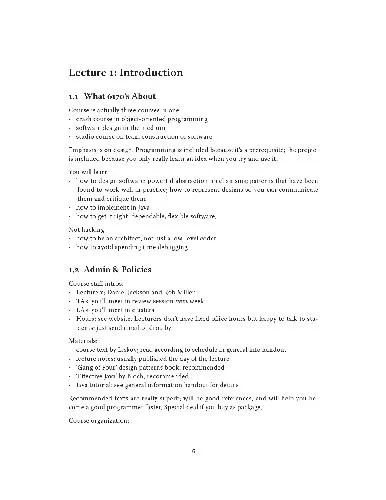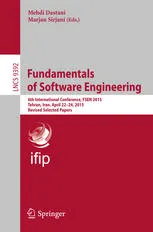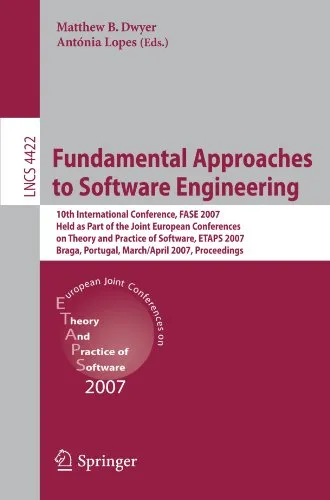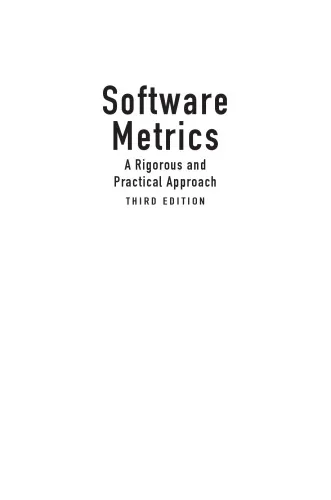Fundamentals of Software Engineering: Engineering Handbook
3.9
بر اساس نظر کاربران

شما میتونید سوالاتتون در باره کتاب رو از هوش مصنوعیش بعد از ورود بپرسید
هر دانلود یا پرسش از هوش مصنوعی 2 امتیاز لازم دارد، برای بدست آوردن امتیاز رایگان، به صفحه ی راهنمای امتیازات سر بزنید و یک سری کار ارزشمند انجام بدینکتاب های مرتبط:
مروری کلی بر کتاب
کتاب Fundamentals of Software Engineering: Engineering Handbook یکی از معتبرترین منابع در زمینه اصول مهندسی نرمافزار است که با جزئیات فراوان به فرآیندها، متدلوژیها، ابزارها و تکنیکهای نوین در طراحی و توسعه نرمافزار میپردازد. این کتاب برای دانشجویان، متخصصان، مهندسان نرمافزار و حتی مدیران پروژه کاربرد دارد تا آنها را در درک عمیقتر از مفاهیم اصلی دنیای نرمافزار یاری کند.
این اثر به زبانی ساده اما علمی نوشته شده و تمامی مفاهیم مرتبط با مهندسی نرمافزار از جمله Software Development Life Cycle (SDLC)، معماری نرمافزار، Testing، و مدیریت پروژه را پوشش میدهد. نویسنده تلاش کرده است تا ارتباط موثری بین اصول تئوریک و کاربردهای عملی برقرار کند و این کتاب را به یکی از منابع جامع در این زمینه تبدیل کرده است.
چکیدهای از کتاب
این کتاب در چندین بخش اصلی تنظیم شده است که هر کدام موضوعات کلیدی مربوط به مهندسی نرمافزار را بررسی میکنند. ابتدا با اصول اولیه مهندسی نرمافزار آغاز میکنیم، جایی که مفاهیمی چون Software Development Methodologies، مدیریت ریسک در پروژههای نرمافزاری، و اهمیت مستندسازی مطرح میشود. سپس به موضوعاتی مانند طراحی الگوریتمها، معماری سیستم و اهمیت امنیت نرمافزار پرداخته میشود.
در بخشهای میانی، مراحل مختلف SDLC شامل Requirement Analysis، Design Phase و Implementation به طور مفصل شرح داده میشود. در نهایت، Testing و تضمین کیفیت نرمافزار (Quality Assurance) و ابزارهای مربوط به آن مورد بررسی قرار گرفته است. نویسنده تمامی مطالب را با مثالهایی از دنیای واقعی تقویت کرده است تا خواننده بتواند مفاهیم را به شکل عملی لمس کند.
نکات کلیدی که از این کتاب یاد خواهید گرفت
- روشهای برنامهریزی و مدیریت پروژههای نرمافزاری
- آشنایی با نقش Testing در افزایش کیفیت نرمافزار
- اصول طراحی الگوریتمها و پیادهسازی آنها
- چگونگی مدلسازی سیستمها با استفاده از UML
- کاربرد بهترین ابزارهای توسعه نرمافزار در دنیای واقعی
جملات ماندگار از کتاب
“Software Engineering is not just about coding; it's about crafting solutions to problems, managing risks, and delivering value.”
“Architecture is the blueprint of success in any software system. Without it, chaos is inevitable.”
چرا این کتاب اهمیت دارد؟
در دنیای امروز که فناوری در هر جنبهای از زندگی انسانها نفوذ کرده است، یادگیری اصول مهندسی نرمافزار اهمیت فزایندهای پیدا کرده است. این کتاب با رویکرد جامع خود، نه تنها تئوریهای مهندسی نرمافزار را آموزش میدهد، بلکه راهکارهای عملی و ابزارهای لازم برای موفقیت در پروژههای واقعی را معرفی میکند. از سوی دیگر، داشتن درک عمیق از مفاهیمی چون توسعه چابک (Agile Development)، DevOps و Continuous Integration برای حرفهایها یک الزام محسوب میشود.
این اثر به شما کمک میکند تا به طور ساختاریافته دانش خود را در زمینه طراحی و توسعه نرمافزار به سطح بالاتری برسانید و از مفاهیم پیچیده به صورت ساده و قابلفهم استفاده کنید. به همین دلیل، این کتاب برای همه افراد، از دانشجویان گرفته تا مدیران پروژه، یک منبع ایدهآل محسوب میشود.
Introduction to "Fundamentals of Software Engineering: Engineering Handbook"
"Fundamentals of Software Engineering: Engineering Handbook" is an authoritative guide designed for students, professionals, and enthusiasts who aspire to gain a comprehensive understanding of software engineering principles. Authored by Rajat Gupta, this book establishes a strong foundation in both theoretical and practical aspects of software engineering, making it a staple for anyone looking to excel in this ever-evolving discipline.
In today's fast-paced technological landscape, software engineering has become a cornerstone for innovation and development. This book aims to demystify the concepts of software engineering, ranging from fundamental principles to advanced methodologies. Whether you are preparing for a career in technology, enhancing your existing skills, or simply curious about how quality software is developed and maintained, this book will serve as your ultimate guide.
The "Engineering Handbook" emphasizes clarity, practical applications, and real-world relevance. It not only introduces readers to critical concepts like software development life cycle (SDLC), design patterns, and testing strategies but also explores modern tools, emerging technologies, and industry best practices. Rich with examples, case studies, and actionable insights, this book ensures that readers walk away with an enriched understanding of software engineering.
Detailed Summary
The book navigates the reader through the expansive domain of software engineering in a structured, easy-to-follow format. It begins by introducing the fundamentals — what software engineering is, its significance, and its role in technological innovation. Progressively, it dives into core topics such as requirements analysis, system design, implementation strategies, testing, and deployment. Specialized areas like Agile methodologies, DevOps practices, and cloud-based development are also discussed comprehensively, keeping the content relevant to contemporary industry standards.
This handbook stands out because of its balanced approach. It merges theoretical depth with practical applicability, making it equally useful for academicians and industry practitioners. Each chapter concludes with exercises, real-world case studies, and best practices that learners can implement directly in their projects.
Key Takeaways
- Comprehensive Coverage: Detailed exploration of both foundational and modern-day practices in software engineering.
- Hands-On Learning: Insights into how real-world software systems are designed, implemented, and maintained.
- Industry Best Practices: Focus on Agile, DevOps, object-oriented design, and cloud-native solutions.
- Case Studies: Learn software engineering principles through engaging examples that directly relate to industry challenges.
- Problem-Solving Focus: Equip yourself with the tools to tackle real-world challenges in software development and testing.
Famous Quotes from the Book
- "Great software begins with a clear understanding of user needs, solid design principles, and a commitment to quality."
- "Software engineering is not just about writing code; it's about crafting reliable, maintainable, and scalable solutions for the real world."
- "Testing isn't about finding bugs; it's about delivering confidence — confidence that what you've built works as intended."
- "The success of a software project hinges as much on collaboration and communication as on technical prowess."
Why This Book Matters
With technology affecting nearly every aspect of our lives, software engineering has become a critical discipline shaping the future of industries. "Fundamentals of Software Engineering: Engineering Handbook" bridges the gap between theory and practice, offering readers a reliable guide to succeed in this field. The book is structured to meet the diverse needs of readers, whether they are beginners just stepping into the field or experienced professionals looking to deepen their expertise.
Furthermore, the emphasis on practical applications ensures that the concepts learned can be implemented in actual projects, making this book not merely a theoretical resource but a valuable asset for career growth. Its focus on current tools and methodologies ensures that readers are well-prepared to adapt to the rapidly changing technological landscape, making them competitive and effective in the job market.
Ultimately, this book matters because it instills both confidence and competence in its readers. It is a guide that enables them to solve complex challenges, deliver high-quality software, and make a meaningful contribution to the tech-driven world around us.
Dive into "Fundamentals of Software Engineering: Engineering Handbook" today and equip yourself with the knowledge and tools needed to thrive in the dynamic world of software engineering.
دانلود رایگان مستقیم
شما میتونید سوالاتتون در باره کتاب رو از هوش مصنوعیش بعد از ورود بپرسید
دسترسی به کتابها از طریق پلتفرمهای قانونی و کتابخانههای عمومی نه تنها از حقوق نویسندگان و ناشران حمایت میکند، بلکه به پایداری فرهنگ کتابخوانی نیز کمک میرساند. پیش از دانلود، لحظهای به بررسی این گزینهها فکر کنید.
این کتاب رو در پلتفرم های دیگه ببینید
WorldCat به شما کمک میکنه تا کتاب ها رو در کتابخانه های سراسر دنیا پیدا کنید
امتیازها، نظرات تخصصی و صحبت ها درباره کتاب را در Goodreads ببینید
کتابهای کمیاب یا دست دوم را در AbeBooks پیدا کنید و بخرید
1386
بازدید3.9
امتیاز0
نظر98%
رضایتنظرات:
3.9
بر اساس 0 نظر کاربران
Questions & Answers
Ask questions about this book or help others by answering
No questions yet. Be the first to ask!








![Fundamentals Of Software Engineering, 5Th Ed [Paperback] Mall](https://s3.refhub.ir/images/thumb/Fundamentals_Of_Software_Engineering__5Th_Ed__31573.webp)






